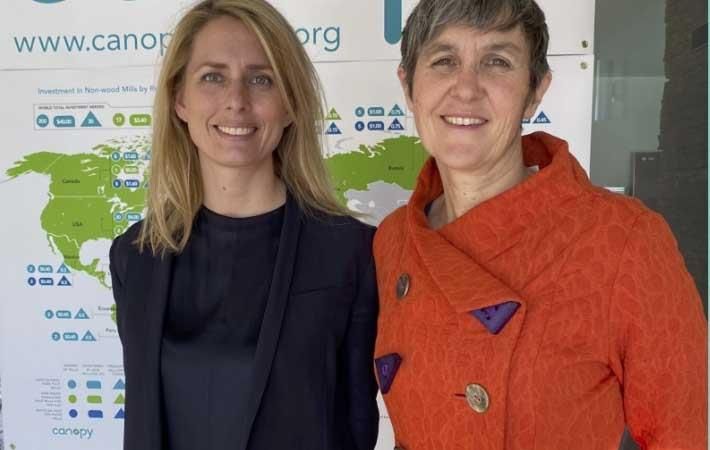Canopy action plan to transform paper, textile industries

Canopy's Founder and Executive Director, Nicole Rycroft, and H&M Chief Operating Officer, Helena Helmersson, at launch of SURVIVAL in Davos. Pic: Canopy Planet
International environmental group Canopy on January 21 launched in Davos a visionary action plan to transform the unsustainable global paper packaging and viscose textile industries by removing half of the forest fibre from pulp manufacturing and replacing it with next-generation alternative fibres like agricultural residues and waste cotton textiles.
Doing so will enable 30 per cent of the world’s forests to bes conserved by 2030. The report provides a lifeline for averting the climate and biodiversity catastrophe within ten years, according to a press release from the organisation.International environmental group Canopy on January 21 launched in Davos a visionary action plan to transform the unsustainable global paper packaging and viscose textile industries by removing half of the forest fibre from pulp manufacturing and replacing it with next-generation alternative fibres like agricultural residues and waste cotton textiles.#
The transformation will cost $69 billion over the next decade to establish mills that can pulp alternative fibres, introduce reduction and efficiency initiatives and plant new well-sited, well-managed fibre supply forests, which in turn enable the restoration of plantations currently located on high carbon and biodiverse landscapes.
The ‘Next Generation Action Plan’ outlines the steps that need to be taken by industries, investors and corporate buyers to safeguard more of the world’s forests. It has been developed in response to the climate crisis and extinction crisis threatening thousands of species worldwide, and has support from key corporate players.
Achieving the target will require 200 agricultural fibre pulp mills, 107 recycled pulp for paper mills, and 17 recycled cotton garment or microbial cellulose fibre dissolving pulp mills, and 5 million hectares of new forests for fibre planted on lands not prioritized for food production, habitat restoration or carbon storage. Sixty five million tonnes of consumption will be reduced through re-use and material-efficient design initiatives
Canopy believes that this ambitious but achievable scenario provides a clear path to helping protect our planet for all life.
Fibre2Fashion News Desk (DS)
